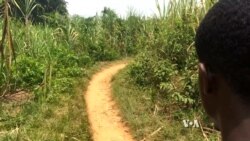When Liberia reopened its borders earlier this year after the Ebola outbreak came under control, many people thought it was premature, with the virus still rife in Sierra Leone and Guinea. The border is porous and hard to control under the best of times.
Until last year, the long stretches of open border were not an issue. People here have family on both sides of the border and often crisscrossed it. Then, Ebola swept through, killing more than 10,000 people in Liberia, Sierra Leone and Guinea in a year.
Now with Liberia closing in on a zero infection rate, some people worry that informal border crossing here is risky because Ebola is still a problem in Guinea.
The Liberian government just does not have the capacity to monitor the entire frontier, said Nimba County Inspector Reginald Mehn.
“Even you can bring all the army in Liberia here at that border line, cannot stop somebody from the Liberian side crossing to go to Guinea because they eat together, they do everything in common. They speak the same accent,” Mehn said.
The government has relied on international help to educate Liberians. With funds from USAID, the American aid organization Mercy Corps created a network of about 70 local groups that raise awareness across Liberia. Because they enlisted Liberians, organizers say people were more likely to trust the message.
Jzohn Alexander Nyahn, executive director of CHESS, the local organization that took the lead here in the town of Wipah, said working with the community is the best way to fight Ebola.
“I personally don’t believe if we should close the border, it’s going to stop the spread of Ebola,” he said. People have to get to markets and health facilities. “And when they travel, you don’t know the person as a Guinean. They speak the same dialect we speak in Nimba.”
Young Liberians from within and outside Wipah inform residents about Ebola every day. They go door to door, answer questions, dispel concerns and organize a group discussion once a month. And it seems to be working.
A few weeks ago, a woman suffering from cancer sought help from a traditional healer in Guinea. When she returned across the border, she died. Alarmed Wipah residents called the authorities in case she had contracted Ebola - vigilance they hope will keep the deadly virus at bay here until the Ebola threat in Guinea is no more.





